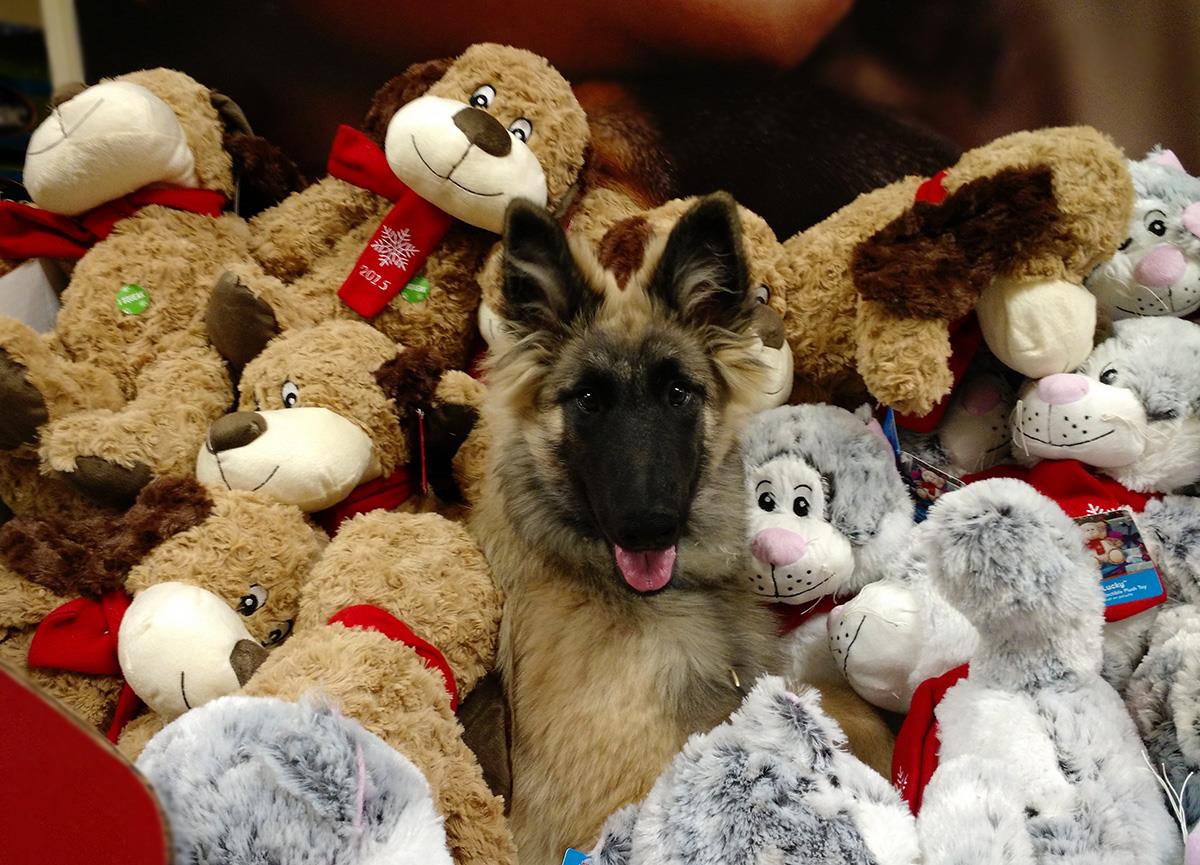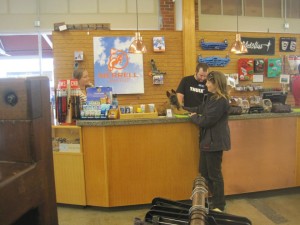One puppy behavior that cannot be taught without help is how to meet new people. Each of us needs interactions with novel people so that our puppies can practice appropriate greetings and learn that people are fun and not frightening. I have wrestled quite a bit with whether or not to blog about this: I do not want to seem condescending or strident, and this is information most readers of this blog will likely be very certain they already know! However, for the past few months I have been taking a puppy around to socialize and meet lots of people, and I have been reminded over and over again how many people out there—even people with extensive dog experience and great intentions—interact with puppies in ways that are problematic.
So please do not take this as scolding, but as an opportunity for us all to pause and think about how we can help one another… And do not interpret any of this to mean you should not interact with puppies—it is very much appreciated when you take a few minutes to help us socialize! But puppies learn very quickly, and it does not take many bad encounters to have a significantly negative impact. So give a little thought to how you can be a positive influence.
Here are a few thoughts:
Things to do:
- Have a conversation—the single best step you can take to making your interaction beneficial for the puppy is to have a conversation with the owner before you do anything with the puppy.
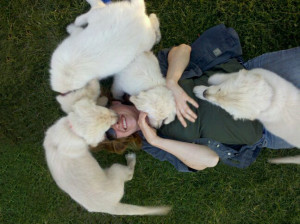 Ask them about how they want the interaction to go, what things to avoid, what to encourage. No two puppies are identical, and what would be super helpful with one puppy might be quite harmful with another. You do not know their goals, their issues, you must ask!
Ask them about how they want the interaction to go, what things to avoid, what to encourage. No two puppies are identical, and what would be super helpful with one puppy might be quite harmful with another. You do not know their goals, their issues, you must ask! - Listen to the owner—no matter how knowledgeable you may be, you do not know what this owner and dog want. You must carefully listen to what they tell you.
- Listen to the dog—observe the dog closely while interacting. If it is intimidated by what you are doing, back off. If it is pulling back or trying to avoid you, stop. If it is getting too excited and frenetic, slow your actions and reduce your energy. This is not a contest to get the dog to love you the most, it is a long process to get the dog to react to new people the way the owner wants.
- Start easy, get harder—you can always increase the intensity and difficulty, but if you come on too strong it is very difficult to undo.
- Be calm but friendly—almost nobody wants a dog that goes crazy and gets frantic when it meets new people.
- When in doubt, ignore—if you are not sure; if a puppy seems nervous or hyper or whatever, and you are not sure what the owner would like, the safest path is to ignore the puppy while you ask the owner.
- You are not entitled—this is not your puppy. Sometimes the owner way not want the puppy to meet you at all. Or may want you to ignore the puppy. You do not know what that they may be working on at any given moment, so do not take it personally if it does not involve you…
Things to avoid:
- Too much energy—many dog lovers coming rushing in and start frenetically playing. This is overwhelming to some puppies, but to many it simply creates an expectation that greetings are supposed to be super-high-energy, which is almost never what an owner wants. Calm, friendly, thoughtful greetings are far more desired by most owners. After the initial greeting is over, many owners will appreciate your having a good play session with their puppies, but initially calm is much better than too energetic.
- Telling them to sit, sit, sit—this is a very well-intended recent trend. Lots of pet owners and Petco trainers, learned the idea that a great way to avoid jumping up is to reinforce an incompatible behavior, and so they ask every puppy to sit. And in truth, this might be a fine trend, except that most people do it poorly. Their timing is awful.
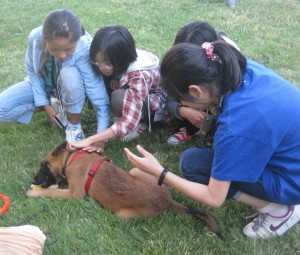
- Approaching too directly—when you see a puppy and immediately rush straight towards it, think about how this looks to the puppy.
- Petting them on the top of the head—some dogs love this, some owners want to work on this, but in general, most dogs would prefer if you do not start out petting them on their heads.
- Grabbing them or pulling them towards you—most dogs have a natural opposition reflex, especially to being pulled towards a stranger.
- Petting them roughly—many puppies do not want to be whacked, tousled, slapped, etc.
- Correcting them—unless we have discussed it, you do not know the rules I have taught my puppy. So if he paws at you that may be exactly what I trained him to do. If he jumps up on you, or mouths your hand, or lies down, or stands, whatever he does, you should not correct unless you know it is something he is not supposed to do…
- Pushing them too far—I was at a seminar recently with my puppy, and he was having a great time meeting new people in a new place with lots of dogs and commotion. And a lady came over, sat down, and started harassing him. Grabbing his feet, lifting him up, grasping his testicles… And she kept it up until he was trying to get away from her and she would not let him get away. All the while she was explaining to me how much people appreciate her playing with their puppies, how she desensitizes them to lots of strange things, how she is beloved as a molester of puppies. It is not your job to torment my puppy. If I want or need my puppy to have that experience, I will ask someone I know and trust. I might even ask you, but it is not your place to decide to push my puppy.
- Your adult dog correcting them—unless we have discussed it in advance, I do not want my puppy to have negative experiences with other dogs. If you are not 100% sure that your dog is great with puppies, please stay away. Many people bring their dogs over to meet my puppy and when I ask if their dog is good with puppies, they tell me they do not know. @#$^$%&#&!! Do not experiment with my puppy. A bad experience can cause issues that will take years to resolve or may never be undone. Oh, and noise counts. I have had several people tell me their dogs are good with puppies, then their dog reacts negatively and growls, barks or otherwise tells off my puppy, and they say, “See, she doesn’t ever make contact…” Contact is not the issue—I am far more concerned about psychological trauma then physical trauma, so if your dog is not welcoming and benevolent tell me so I can keep my puppy away!
- Your dog being too forward—If your dog loves puppies and people and comes rushing up into my puppy’s space, there is a good likelihood that my puppy will be frightened. MAny puppies are sensitive to pressure, particularly from adult dogs. Keep your dog under control and a bit away, and let me bring the puppy over. This way the puppy can approach at his pace and not get overwhelmed.
- Your dog being too interested in me—many puppies are a little insecure and even jealous about their owner. If your dog comes running in and greets me super enthusiastically, it may be negative for my puppy.
- Your dog making things negative—I was practicing tunnels with my puppy when someone else came in and let their puppy say hello. Which was great. But every time my puppy tried to go into a tunnel, theirs would blast in after him, sometimes same direction, sometimes opposing, and would either knock my puppy over or just startle him. Later I was working my puppy on a table, and she encouraged her dog to jump up and essentially knock him off the table. These actions made my puppy far less confident about tunnels and tables—he is not sure another dog will not come knock him down…
- Playing keep away—I am a little flabbergasted when people come up and take my puppy’s toy and don’t give it back. What is this game supposed to be? It is just obnoxious. Sure, you can tease the puppy, move the toy quickly, but the goal is to get the puppy to try harder and when they do try hard, they should win! If you want a toy, go get one, but that toy is my puppies, so if you are going to play with it make sure you do it in a way that is pleasing to my puppy.
- Pretending to throw something—much like keep away, I am not really sure what people think they are doing. Yes, if you try you can fool the puppy. Bravo for you. But you are diminishing the puppy’s desire to fetch and decreasing his inclination to trust humans.
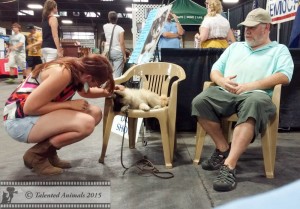
- Tugging on their toy too hard—although it may not always feel like it, puppies have small teeth and weak jaws, and we do not want tug to be unpleasant.
- Intruding on training—if I am not looking at you, and am clearly working on something with my puppy, do not talk to me. Do not talk to my puppy. Do not call my puppy. Leave us alone, or wait until we are done and approach you.
- Following—if you are approaching and I head the other way, don’t chase me down. It likely means that my puppy is not in the mood to meet you, or that your dog is frightening my puppy, or that for some other reason I do not want to interact with you right now.
- Picking them up—I cannot believe how many people think it is ok to run in and pick up a puppy that they hardly know. How would you like it if someone did this to you? Being held is an act of trust. Do not pick up a puppy until you have cleared it with both the owner and the puppy.
- Making lots of baby noises—a surprising number of people squeal and grunt and goo-goo and screech when they see a puppy. This is probably not a huge deal to the puppy either way, but it is really annoying to me, so please stop it.
